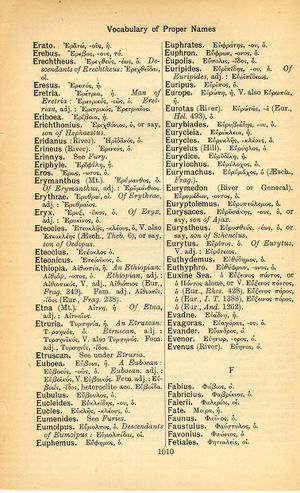Etruria: Difference between revisions
ἧς ἂν ἐπ' ἐλάχιστον ἀρετῆς πέρι ἢ ψόγου ἐν τοῖς ἄρσεσι κλέος ᾖ → of whom there is least talk either for praise or blame, of whom there is least notoriety among the men either for praise or blame
(Gf-D_3) |
(3_5) |
||
| Line 12: | Line 12: | ||
{{Gaffiot | {{Gaffiot | ||
|gf=<b>Etrūrĭa</b>,⁹ æ, f., l’Étrurie [province d’Italie, auj. la Toscane] : Cic. Div. 1, 92. | |gf=<b>Etrūrĭa</b>,⁹ æ, f., l’Étrurie [province d’Italie, auj. la Toscane] : Cic. Div. 1, 92. | ||
}} | |||
{{Georges | |||
|georg=Etrūria (vulg. Aetrūria, Gromat. vet. 250, 19), ae, f., die [[Landschaft]] Etrurien in Italien, j. Toscana, [[Varro]] [[sat]]. Men. 17. Cic. de div. 1, 92. Liv. 1, 35, 9; 10, 37. 1. Verg. Aen. 8, 494: Etruriae populi, Liv. 5, 1, 3: meton. = die Etrusker, Etruriae animos reconciliare, Liv. 5, 5, 10. – Dav. [[Etruscus]], a, um, etruskisch, [[litus]], [[mare]], Hor.: [[bellum]], Liv.: [[disciplina]], die etrusk. Religionslehre, [[bes]]. die Weissagekunst aus Opfertieren, Cic.: [[aurum]], die goldene [[bulla]] (s. d. no. II, B) [[als]] Amulet, Iuven. – Plur. subst., Etruscī, ōrum, m., die Etrusker, Cic. u.a. | |||
}} | }} | ||
Revision as of 08:32, 15 August 2017
English > Greek (Woodhouse)
Τυρσηνία, ἡ.
An Etruscan: Τυρσηνός, ὁ.
Etruscan, adj.: Τυρσηνικός, V. also Τυρσηνός. Fem. adj., Τυρσηνίς, -ίδος.
Latin > English (Lewis & Short)
Ē̆trūrĭa: (Het-), ae, f.,
I a country of central Italy, Mel. 2, 4, 2; Plin. 3, 5, 8, § 50; Cic. Div. 1, 41, 92; id. Cat. 2, 3 fin.; Varr. L. L. 5, § 32 Müll.; Liv. 1, 35, 9; Verg. A. 8, 494; 12, 232 et saep.—Deriv.,
II Ē̆truscus, a, um, adj., of Etruria, Etruscan: litus, Mel. 2, 7, 19; Hor. C. 1, 2, 14; id. C. Sec. 38; id. Epod. 16, 40: mare, id. C. 3, 29, 35: juga, Verg. A. 8, 480: duces, id. ib. 11, 598: manus Porsenae, Hor. Epod. 16, 4: disciplina, the Etruscan religion, Cic. Fam. 6, 6, 3; Plin. 2, 83, 85, § 199; 10, 15, 17, § 37; cf. haruspices, Gell. 4, 5, 5: litterae, Liv. 9, 36: coronae, made of gold and precious stones, and worn by those who triumphed, Plin. 21, 3, 4, § 6.—Sing., Plin. 33, 1, 4, § 11; Tert. de Coron. 13: aurum, a golden amulet worn by Roman boys of noble birth, Juv. 5, 164 et saep.—Subst.: Etrusci, ōrum, m., the Etruscans, Cic. Div. 1, 42; Liv. 1, 34; 2, 7 et saepiss.
Latin > French (Gaffiot 2016)
Etrūrĭa,⁹ æ, f., l’Étrurie [province d’Italie, auj. la Toscane] : Cic. Div. 1, 92.
Latin > German (Georges)
Etrūria (vulg. Aetrūria, Gromat. vet. 250, 19), ae, f., die Landschaft Etrurien in Italien, j. Toscana, Varro sat. Men. 17. Cic. de div. 1, 92. Liv. 1, 35, 9; 10, 37. 1. Verg. Aen. 8, 494: Etruriae populi, Liv. 5, 1, 3: meton. = die Etrusker, Etruriae animos reconciliare, Liv. 5, 5, 10. – Dav. Etruscus, a, um, etruskisch, litus, mare, Hor.: bellum, Liv.: disciplina, die etrusk. Religionslehre, bes. die Weissagekunst aus Opfertieren, Cic.: aurum, die goldene bulla (s. d. no. II, B) als Amulet, Iuven. – Plur. subst., Etruscī, ōrum, m., die Etrusker, Cic. u.a.

